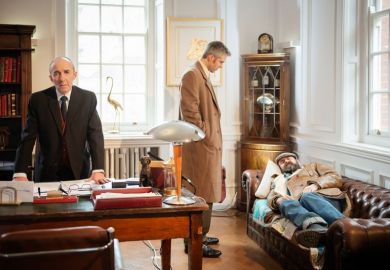One of Times Higher Education’s most regular and treasured contributors has died at the age of 60.
Alex Danchev was professor of international relations at the University of St Andrews and wrote prolifically in this area. Yet he was also a true polymath who was happy to stray well beyond the expected boundaries of his day job. He published two major collections of essays addressing some of the thorniest issues of our time, On Art and War and Terror and On Good and Evil and the Gray Zone. And he was also passionately interested in the visual arts, as shown by his biographies of Georges Braque and Paul Cézanne, an award-winning new translation of Cézanne’s letters and an anthology of 100 Artists’ Manifestos: From the Futurists to the Stuckists.
And that’s just his own books! For more than two decades, Danchev was one of our go-to reviewers, equally informed and incisive when dealing with books about Caravaggio or Noam Chomsky, Rudolf Nureyev or Donald Rumsfeld, Britain in the 1950s or the Red Cross. When asked to contribute to our Off Piste series, he produced some superb reflections on jazz. In recent years, as he described in a more confessional piece published in our My Eureka Moment series, Danchev became increasingly preoccupied by trying to “understand what it is about a few daubs of paint on canvas that is so meaningful for us, and so consequential”.
Although I never got the chance to meet him, I commissioned him to write many reviews of major exhibitions and was invariably thrilled by the results. Along with a deep sense of the power of art, his responses were always totally compelling and individual, intensely attentive to detail and expressed in wonderfully vivid prose.
Here he is, for example, on Anselm Kiefer: “Contrary to popular belief, it is given to artists, not politicians, to create a new world order. The Kieferworld is rich and strange, boundless and immersive, elemental and metaphysical. This artist traffics in fundamental truths…
“Perhaps the most striking quality of the cataclysm at the [Royal Academy] is the material. Kiefer sees artworks as actions, as he says, and not as consummate creations. The Kieferworld is in the process of perpetual transformation. Climate change has come indoors. The artworks slip and slide, corrode and erode. They age, and shed, and flake. They are weathered and distressed, scarred and mutilated. Violence is done to them, with a variety of weapons. Here are the survivors. They may or may not be happy in their skin.”
Equally memorable was Danchev’s take on Lucian Freud: “Freud was a great painter of the penis, the forehead, the breast. Dogs, beds, rats and rags were meat and drink to him. The brushwork sings of corpulence, contentment and creaturely detail. Naked Man with Rat (1977-78) features the rat’s tail, draped luxuriantly over the naked thigh, something for us to look at, raw, not cooked.”
Many others have praised Danchev since his death. Garry Taylor, acting principal and master of St Andrews, described him as “a man of great personal warmth, hugely committed to his students; and who was passionate, and deeply articulate, about the wide range of topics that interested him. Both in the school and across the wider university, we will recall his profound commitment to an interdisciplinary exploration of the power of the artistic imagination to illuminate the human and social worlds.”
Those offering tributes on Twitter called him the “smartest person I've ever met”, “a truly brilliant scholar and an incredibly generous person” and a writer “who will live on via his towering work on US-UK relations, political art & [military historian] Liddell-Hart”.
“Alex was already reviewing for The Times Higher Education Supplement when I joined in the mid-1990s,” recalls Ann Mroz, now the editor of the TES, “and over the years I got to know him and his work well. He was a professor of international relations, but with his dazzling intellect could turn his hand to any subject, which he often did. When I became responsible for commissioning, I used him so much that his colleagues at the University of Nottingham (where he worked at the time) jokingly referred to this publication as The Times Higher Danchev Supplement. Alex was a true bon vivant, delightful company, and kind and generous. He was the best writer I ever commissioned; I suspect he always will be.”
Register to continue
Why register?
- Registration is free and only takes a moment
- Once registered, you can read 3 articles a month
- Sign up for our newsletter
Subscribe
Or subscribe for unlimited access to:
- Unlimited access to news, views, insights & reviews
- Digital editions
- Digital access to THE’s university and college rankings analysis
Already registered or a current subscriber?








